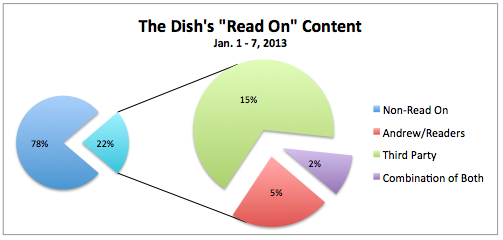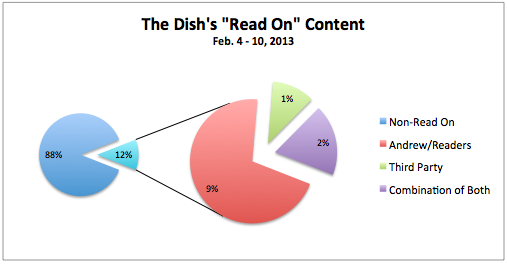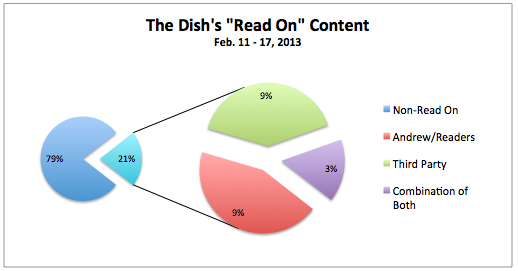A week ago, I took a look at Andrew Sullivan’s blog, The Dish, in order to see how the implementation of a “Read On” meter had affected the content structure of his blog. I found the following:
Bottom line: Andrew Sullivan has almost perfectly inverted his “Read On” content from before to after the implementation of the meter. From January 1 to 7, he posted 231 times; of those, only 52 (22.5%) included “Read On” buttons. Of those 52 “Read On” sections, 35 consisted primarily of third-party content (67.3%), 12 mostly contained material produced by Andrew and his readers (23.1%), and the remaining 5 were a combination of Andrew/readers and third-party content (9.6%).
From February 4 to 10, however, several things changed. The number of total posts was almost identical to the January period (227), but — as he promised — there were significantly fewer “Read On” posts in the first week of the new meter (27, or only 11.9% of the total). Of those 27, 19 contained content primarily contributed by Andrew and his readers (70.4%), 5 contained a combination (18.5%), and only 3 “Read On” sections during the entire week contained content mostly attributable to third parties (11.1%, or 1.3% of the entire population of posts this past week).
For more on the methodology of exactly how I categorized Sullivan’s various posts, see the original post. The first graph below depicts the stats for January 1 – 7, a week I chose as the control group for The Dish‘s content structure before the meter:

This second graph portrays the composition of The Dish‘s content from the very first full week that the meter was in effect, February 4 – 10:

As Sullivan pointed out, The Dish rolled out the meter slowly in its first week: compared to the control week in January, when 22% of all posts contained “Read On” buttons, only 12% of all posts had the button in the first week of the meter. Furthermore, the type of content behind the meter was quite different: whereas the control period was dominated by third-party content beyond the “Read On” button, in the first week of the meter the majority of “Read On” sections primarily contained content produced by Andrew Sullivan and his readers.
Because that first week under the new meter was intended to be a bit of a test run, it remained to be seen how the stats would change (or stay the same) once the “Read On” button began to be used at a more normal frequency. So as a follow-up, I’ve now conducted an identical study of the very next week, February 11 – 17.
The total number of posts was similar to that of the previous two periods (237). Of those posts, 50 (21.1%) contained a “Read On” button: note that this is almost exactly the same percentage as in the control week (22.5%). Of those 50 sections located after the “Read On” button, 22 (44.0%) contained content primarily produced by Andrew and his readers, 20 (40.0%) contained content mostly taken from third-party sources, and the remaining 8 (16.0%) contained a combination of both. See the graph below:

Again, I have shared the entire Excel spreadsheet here, in case anyone wishes to contest my methodology or categorization. As I mentioned in my original post:
Obviously, there is a small subjective element to the endeavor. However, this is probably much less significant than one might think: the vast majority of posts on The Dish – and this applies equally to the “Read On” and non-”Read On” sections of each post – quite clearly fall into one of the three categories specified above: content produced primarily by Andrew and/or his readers, content produced primarily by third parties, and content containing a mixture of both.
So after a pretty significant dip in “Read On” posts in the first week of the meter — while the kinks were being ironed out — The Dish‘s content has since returned to its pre-meter ratio of non-“Read On” to “Read On” posts. However, what lies beyond the meter has shifted: whereas 67.3% of all “Read On” sections before the meter contained mostly third-party content, now the plurality of “Read Ons” (44.0%) consist of content provided by Andrew and his readers (from analysis to letters to views from people’s windows). The proportion composed of third-party content has fallen to 40.0%, with the remaining 16.0% of all “Read On” sections comprised of material that contains both.
What this likely means is that Sullivan and his team have taken to heart the precautions of readers and commentators who noted that, to charge for content, the part that’s hidden to non-subscribers should tend to be more original — as opposed to a curation of third-party material.
One thing I didn’t touch on in my original post, but which I did measure, is the composition of every post before the “Read On” button — that is, the portion of each post one can see whether or not one is a subscriber. (This includes posts without a “Read On” button at all.) In the January 1 – 7 period, content was divided thusly: 67.5% of pre-“Read On” sections were primarily third-party content, 21.6% were content produced by Andrew Sullivan and his readers, and the remaining 10.8% were a mixture of both. (This was an almost identical proportion to the composition of the material after the “Read On” button during the same period.)
For the February 4 – 10 period, these numbers were: 64.8% = third-party content, 22.5% = Andrew/readers, and 12.8% = a combination. (I’m rounding to one decimal point here, so that’s why it doesn’t add up to exactly 100.0%.)
And for this last week (February 11 – 17), here are the proportions: 63.7% = third-party content, 21.5% = Andrew/readers, and 14.8% = a combination. Considering the fact that all three time periods had almost identical compositions of material before the “Read On” button, the significant changes in material beyond the button present an even starker contrast.
I believe Sullivan mentioned recently that if the pace of subscribers didn’t pick up, he may “nudge” them towards paying their dues. This could happen in one of two ways. Either he could reduce the number of monthly “Read On” clicks it takes to trigger the meter (it’s currently at seven), or he could introduce more “Read On” posts as a percentage of his total posts. As an early subscriber, it doesn’t really matter to me which one he chooses. But so far at least, the content lying beyond the “Read On” button certainly seems to justify the annual fee.
Related articles
Post Revisions:
- May 21, 2013 @ 01:20:46 [Current Revision] by Jay Pinho
- February 19, 2013 @ 01:44:41 by Jay Pinho
- February 18, 2013 @ 22:56:24 by Jay Pinho











One question this doesn’t address is the extent to which readers are using means to subvert the paywall (twitter, google). If Sullivan needed to increase revenue, because of the holes in the paywall (by design), it’s not at all clear that moving more content behind the wall would actually generate more revenue.
Certainly it’s worth exploring, and one of the wonderful things about the web is that Sullivan could run A/B testing on his site a week at a time to discover all this. I would guess that more content behind the paywall means a small uptick in subscribers, but a drop in overall pageviews as many readers unwilling to pay find the site lacks enough free content to maintain their visit rates.
You raise a few good points. A lot of it depends on what percentage of his overall posts contain a “Read On” button. If it stays around the 22% range, as it is now, I think there’s still plenty of great content on the site without having to sign up. (Of course, if you’re a fairly hard-core Dish reader like me, then you’ll sign up anyway.)
For this very reason, though, Sullivan may decide — as you suggest — that he has to put more content behind the meter. I’m not sure what effect this will have, but your hypothesis (more subscribers, fewer pageviews) seems like a pretty reasonable guess.
Sullivan did change my behavior. Before, I tended to expand the article and read the third party content excerpted. Now I will click the link and read the third party content where it’s posted. This is why I’m HERE for instance.
As I do not ever intend to subscribe, I consciously think about whether to hit the read on button or not.
I see what you mean. I used to have a similar reaction to reading New York Times pieces until I’d hit their monthly meter too. But they slowly broke my will, since I’m an avid NYT reader, so I finally just bit the bullet and subscribed.
One thing you’ll miss out on at The Dish, though, is that if Sullivan provides any of his own commentary after the button, you won’t be able to see it simply by clicking on the external link. On the other hand, as long as you click carefully, you should be able to make your seven monthly “Read On”s last for a while.
Even semi-walled gardens force someone to assign value to information. Thinking about it a little more, I think I use Sullivan in a different manner than most of his readers. I use him more like aggregator of funny or interesting socio-political links. If I read him more for his own voice as a largely sane conservative, I might feel differently about the pay-wall.
Exactly. I’m curious to see how many of his current readers see him the way you do — as a curator or aggregator — vs. the other way you mention — as a “largely sane conservative.” Honestly, I don’t see him entirely one way or the other. I tend to think he’s more of a curator most of the time, but to me the types of writing and features he exposes his readership too is worth the cost of admission.
Whether the people whose content he’s excerpting feel the same way is a different question — although I’d imagine that, for those who aren’t already well-established at media institutions, his links probably provide a significant boon to their own audience.